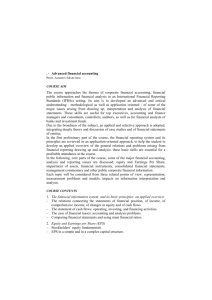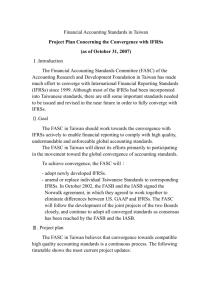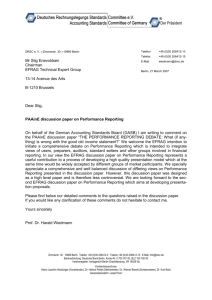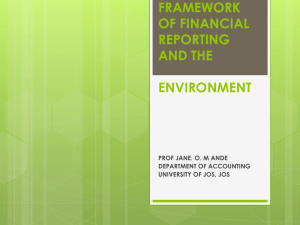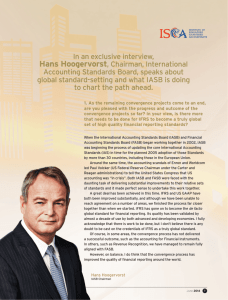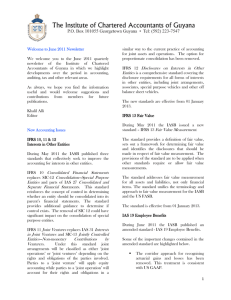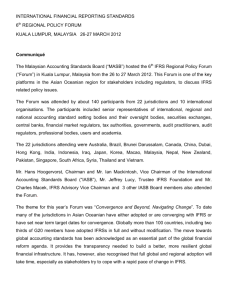The future of IFRSs in Europe - Bundesverband deutscher Banken
advertisement
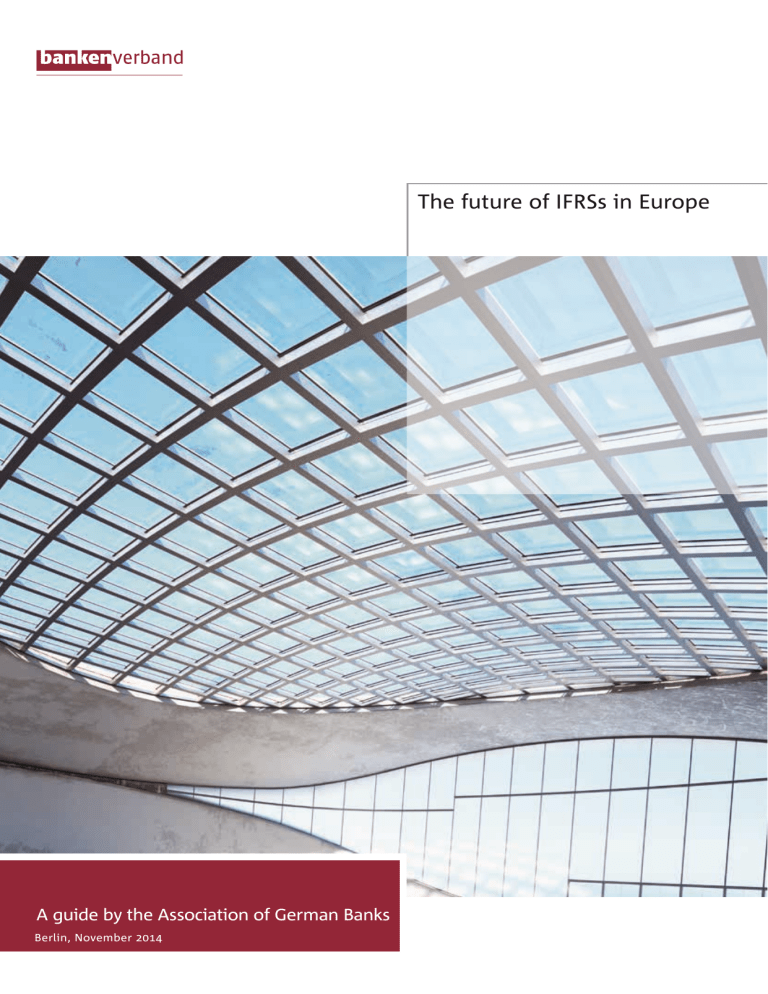
The future of IFRSs in Europe A guide by the Association of German Banks Berlin, November 2014 The future of IFRSs in Europe Berlin, November 2014 Association of German Banks All under one roof … Through International Financial Reporting ­Standards (IFRSs), the EU brings together the accounting rules applying to publicly traded companies under one roof. For this reason, the transparent roof is a fitting visual accompaniment to the content of this brochure. 4 The future of IFRSs in Europe Contents 1 The future of IFRSs in Europe 2 Significance and development of IFRSs in Europe 6 2.1 Function and limitations of accounting standards 8 2.2 Accounting and regulation 8 2.3 IASB structure 8 2.4 International standard-setting process 11 2.5 IFRSs and supervisory law 12 2.6 European accounting architecture 15 2.6.1 Implementation of IFRSs in EU law (endorsement) 12 2.6.2 Reorganisation of EFRAG – Maystadt Review 13 2.6.3 Role of the European Parliament 15 2.7 Enforcement 16 2.7.1 Role of ESMA 16 2.8 Outlook 17 3 Glossary 18 8 1 The future of IFRSs in Europe Since the adoption of the IAS Regulation (Regulation The International Accounting Standards Board (EC) No 1606/2002 on the application of international (IASB) was set up as a private standard-setting body accounting standards) in 2002, the International composed of representatives from different countries. Financial Reporting Standards (IFRSs) have served The IASB has played a major role over the past few as the authoritative accounting rules for publicly years in creating internationally recognised accounting traded companies in the European Union. Disclosure standards geared to the needs of addressees. Two of financial information is no longer conceivable for developments have given cause for concern recently, such companies without IFRSs. This is because, besides however. Firstly, the US has turned its back to some being an “admission ticket” to the international capital extent on the principle of uniform global standards. markets, the application of IFRSs helps to make financial The US standard-setting body FASB has, for example, statements more meaningful and comparable and to withdrawn from joint work on some projects and is harmonise internal and external accounting. Many EU pursuing its own agenda. Secondly, the debate on member states have therefore expanded the use of a big enough say for Europe in the standard-setting IFRSs on a compulsory or voluntary basis to cover other process and on the IASB’s political legitimation has entities outside the mandatory scope of application. flared up again in Europe. Regardless of this success story, IFRSs have been We take a critical view of these developments. So that repeatedly criticised and questioned in Europe from it can continue to perform its job as an independent the outset. This indicates that the democratic process global standard-setter, the IASB should not be allowed from which they gain their legitimation is working. At to become a plaything of diverging national interests. the same time, however, the debate on appropriate Purely national interests inevitably have to take a back accounting reveals fears and worries that prove to be seat in efforts to develop an internationally accepted unwarranted on closer scrutiny. So it is worth taking a financial reporting convention. The IASB’s work as a look at the – undoubtedly complex – standard-setting standard-setter should therefore be kept largely free process. of political influence in the future as well. This is the only way to ensure high-quality standards and uphold Unlike the conventional legislative process with which the IASB’s good reputation in the long term. we are familiar in Europe, IFRSs are developed by an independent international body drawing on the Irrespective of this, the IASB, as the body responsible expertise and input of preparers, users and auditors, for setting international standards, is, of course, and not set by a government authority. The financial accountable to some degree to preparers and users reports prepared by companies (annual/consolidated of financial statements as well as to political decision- accounts, semi-annual/quarterly reports) are designed makers. Transparent structures and an understandable primarily to provide information to current and standard-setting process are key prerequisites for the future shareholders, debt providers and partners in acceptance and recognition of standards. The IASB business such as suppliers and customers. To meet the standard-setting process, the “due process”, has been information needs of these different stakeholders, it continuously improved over the past ten years to is important that representatives of each group are strengthen transparency and participation, so that involved in the development of IFRSs. a sound and robust process with clear-cut lines of 6 The future of IFRSs in Europe bankenverband responsibility is in place today. One major change was undoubtedly the setting-up of a Monitoring Board in 2009. The Monitoring Board is composed of representatives of financial market watchdogs from Europe, the US and Asia, establishing a direct link to regulators. In Europe, the linchpin of both political and technical control is the endorsement process set out in the IAS Regulation for implementation of IFRSs issued by the IASB in EU law. This endorsement process was thoroughly reviewed and partly modified in 2013. Any European go-it-alone approach must be avoided, however. The non-recognition of individual IFRSs in Europe (carve-out) or the establishment of European accounting rules would be at odds with the target of uniform international accounting standards. The comparability of financial information would be impaired; the result would be a competitive handicap for internationally operating companies based in Europe. Different accounting standards would be problematic particularly from a supervisory perspective. Accounting capital forms the basis for regulatory capital requirements. A level accounting playing field is essential for a single European supervisory regime. In addition to a set of globally recognised accounting standards, the correct uniform application of these standards is a key prerequisite for strengthening investor confidence in efficient capital markets. This is where the European Securities and Markets Authority (ESMA) has played an important role recently. We support ESMA’s activities as long as there is a strict separation between standard-setting and enforcement. On the other hand, setting actual accounting and valuation rules is not ESMA’s job in our view, but should be left to the IASB and the IFRS Interpretations Committee. The future of IFRSs in Europe 7 2 Significance and development of IFRSs in Europe 2.1 Function and limitations of accounting standards as possible. Ultimately, every set of financial reporting rules is based on a convention. In globally converging markets, it is therefore important to adhere to the same Financial reporting’s primary function is enabling convention and to agree on common rules. This applies present and future providers of capital to assess a not only in Europe, but also worldwide. IFRSs have since company’s economic performance. In this context, become established as the internationally accepted it is important that investors, banks and companies language of accounting. speak the “same language”. Capital is often provided today by investors and banks across borders. Uniform, 2.2 Accounting and regulation internationally accepted accounting standards create a common language allowing presentation of a The close connection between accounting and company’s net assets, financial position and earnings regulation should not be overlooked. Accounting in an internationally comparable form. For export- figures generally form the basis for regulatory capital oriented companies, this leads to funding advantages, requirements. The leverage ratio, for example, is linked e.g. a broader funding base, since international venture directly to total assets. Different accounting approaches capital providers and investment banks are increasingly hinder comparability and lead to an unlevel playing asking for IFRS-based financial information. field. IFRS-based financial reporting is particularly important It is true that the action taken by regulators and for internationally operating companies within a group. standard-setters in the area of accounting pursues Different accounting systems mean considerable extra different objectives or serves different purposes. But costs for preparing balance sheets. IFRS-based financial it is equally true that viewing the raft of different reporting also offers the chance to harmonise internal regulatory measures, reporting requirements and and external accounting, which can help to improve accounting standards in isolation is wrong, and creates internal corporate management. over-complexity. A closer dialogue between standardsetters and regulators is therefore desirable. Main benefits of IFRS-based financial reporting Opens up international sources of At the same time, a sense of proportion is 2.3 IASB structure called for when assessing funding Enhances corporate transparency and comparability Harmonises and simplifies group accounting Harmonises internal and external ac- accounting systems. To reach the target of uniform global standards, an Accounting should not international body is needed. For this purpose, the create economic International Accounting Standards Committee (IASC), reality, but simply serve to the forerunner of today’s International Accounting present it as realistically Standards Board (IASB), was founded in 1973 by an representatives of professional accountancy bodies. counting Simplifies and improves communication with shareholders, creditors, banks and interested members of the public 8 The future of IFRSs in Europe Already then, the primary objective was harmonising bankenverband accounting across the globe and creating a uniform by the IASB. The IFRS Foundation, which is run by international Substantial trustees, operates as the oversight body of the IASB. progress has been made in worldwide harmonisation The Board of Trustees currently comprises 22 persons of accounting standards in the meantime. of diverse geographical and professional backgrounds. Virtually all of the 130 countries producing 96% of To enhance the public accountability of the IFRS world GDP have publicly endorsed the IFRSs as global Foundation, the Monitoring Board was set up on accounting standards. 1 February 2009. The Monitoring Board comprises five accounting “language”. members representing the European Commission, the In most of these countries, the use of IFRSs is already International Organization of Securities Commissions mandatory for national reporting. In the US, for (IOSCO) and various securities regulators, and example – one of the leading industrialised nations – provides a formal link between the IFRS Foundation non-US entities are allowed to use IFRSs for reporting to and the relevant public authorities. It is responsible the Securities and Exchange Commission (SEC). for appointing and overseeing the trustees. The IASC has been repeatedly restructured since its The IASB currently comprises 16 members. It is responsible formation. Today, IFRSs are developed and published for developing and publishing IFRSs. Besides the Board, IFRS application for national reporting Permit rather than require IFRS Jurisdictions that require the use of IFRS for all or most public companies 11% Require IFRS only for financial institutions 2% In the process of requiring IFRS 1% 5% Use national or regional GAAP 81% Source: IFRS Foundation. The future of IFRSs in Europe 9 2 a number of other bodies are involved in this process in The a supporting capacity. The IFRS Advisory Council advises structures, including the affiliated advisory bodies, IFRS Foundation governance and control the IASB and the IFRS Foundation on fundamental are regularly reviewed by the trustees and modified questions to do with the work programme, standard- where necessary. setting and project planning. In 2003, the Accounting Standards Advisory Forum (ASAF) was additionally set Even though the IASB and IFRSs are repeatedly up to create an institutional basis for cooperation with criticised on some specific points, the IFRS Foundation national standard-setters and regional bodies. Moreover, generally enjoys broad worldwide support for its work. there are expert groups on key technical issues and The progress made by the IASB in global acceptance of Transition Resource Groups to support the practical IFRSs with a view to creating a single global accounting implementation of new standards. On top of this, the language is unmistakable. IFRS Interpretations Committee provides guidance and advice on the application of IFRSs and on contentious reporting issues. The following diagram provides an overview of the interaction between the different bodies. Three-pillar structure 1 Independent standard-setting and related activities IFRS Foundation International Accounting Standards Board IFRS Interpretations Committee IFRS Advisory Council *Accounting Standards Advisory Forum Sources: IFRS Foundation, IASB. 10 The future of IFRSs in Europe ASAF* 2 Governance and oversight 3 Public accountability IFRS Foundation IFRS Foundation Trustees Monitoring Board bankenverband 2.4 International standard-setting process exchange of views with IASB Strict compliance with the due ­process is representatives In accordance with the IFRS Foundation’s Constitution, at public hearings on a key precondition for ensuring trans­ IFRSs are developed on the basis of clearly articulated individual agenda projects. parent standard-setting and thus long-term principles (principles-based approach). Standard-setting Following evaluation acceptance and recognition of IFRSs. follows a strictly defined process, the “due process”, which the feedback received, Ex­perience shows that early involvement calls for the involvement of all accounting stakeholders the finalised standards are in the standard-setting ­process is vital to at an early stage. issued and published by allow the incorporation of economically the IASB; their application sensible positions into proposed IFRSs. The standard-setting process provides for, among other is mandatory after things, impact analyses and the formation of expert transitional period. of a groups on special agenda projects. The general public is explicitly called upon to comment on the discussion The following diagram shows the various steps in the papers and exposure drafts issued by the IASB. Besides due process: consultation in writing, there is an opportunity for an Standard-setting process Agenda decisions Research Forward-looking needs tests Proposals Discussion paper (optional) Proposals Stakeholders Public consultation Input into standardsetting process Exposure draft Published IFRSs Public consultation Feedback statement Formal endorsement process Two-year IASB post-implementation review Source: IASB. The future of IFRSs in Europe 11 2 2.5 IFRSs and supervisory law 2.6 European accounting architecture IFRSs were developed for publicly traded companies, i.e. 2.6.1 Implementation of IFRSs in EU law companies whose securities are traded on a regulated (endorsement) market. For companies and particularly also for banks which do not use regulated capital markets, IFRSs It is neither politically nor legally possible for an IFRS are only of very limited importance. It is therefore adopted by a private-sector body to have direct legal right not to make IFRS-based accounting mandatory effect in the member states of the European Union. for such entities. In this context, we see the danger For this reason, a special endorsement mechanism was for banks of IFRS-based accounting being introduced built into the IAS Regulation. This mechanism requires “through the back door”, as it were, by the single accounting standards adopted by the IASB to first be European banking supervisor. This would be the case legitimised by a legislative act before being applied in if all banks were to have to comply with the prudential the EU. Up to now, standards have gone through what reporting requirements on an IFRS basis and were thus is known as a comitology process, under which the to be obligated to introduce an IFRS-based shadow European Commission decides whether or not to adopt accounting regime. Generally requiring all banks to use an IAS/IFRS and its associated interpretative guidance. IFRSs solely for prudential purposes would effectively The Commission does not have the power to alter the force banks which file HGB-based accounts (i.e. content of a standard: it can merely restrict its use in accounts prepared in accordance with the provisions the European Union. of the German Commercial Code (HGB)) to draw up two sets of accounts although they neither publish IFRS- The main bodies involved in the endorsement process based accounts nor manage their operations internally are: on an IFRS basis. the European Financial Reporting Advisory Group (EFRAG) the Accounting Regulatory Committee (ARC) the European Commission the European Parliament the European Council This finely balanced process involving a number of parties is about to be reorganised. First, the European 12 The future of IFRSs in Europe bankenverband Commission launched a fundamental structural review funded by contributions from industry and, since 2009, in 2013. Second, the Lisbon Treaty of 1 December 2009 around 50% of its entire budget has come from the grants greater powers to the European Parliament European Commission. and provides for greater involvement of the national parliaments. From the outset, various groups and nations in Europe were critical of the endorsement process and 2.6.2 Reorganisation of EFRAG – Maystadt Review of the way EFRAG functioned. In the eyes of these critics, the EU continues to have too little weight in EFRAG is a private-sector body established in 2001 the international standard-setting process. With the to provide the European Commission with technical aim of strengthening Europe’s role, the European support on accounting matters. One of EFRAG’s key tasks Commission in March 2013 appointed Philippe is to advise the Commission on the question of whether Maystadt, a Belgian politician and former President individual IFRSs should be endorsed for use in Europe. of the European Investment Bank, as a special adviser EFRAG also plays an active part in developing accounting to review the entire institutional infrastructure for standards at IASB level: EFRAG representatives sit on adopting IFRSs, including the governance structures IASB working groups, for instance, and comment on the of EFRAG. The findings of this review were unveiled in IASB’s working papers and exposure drafts. It is partly November 2013 in the Maystadt Report. The report’s Parties involved in the endorsement process IASB EFRAG European Commission European Parliament ARC Interested public European Council Source: European Commission. The future of IFRSs in Europe 13 2 recommendations for adjusting the endorsement The Maystadt Report is quiet on issues such as how process have since been approved by the ECOFIN the High-Level Board and EFRAG TEG will interact with Council and are currently being implemented. one another or how the desired consensus on decisions taken by the High-Level Board will be reached. It will The centrepiece of the reform is a fundamental therefore be interesting to see how its recommendations reorganisation of EFRAG. Membership is to be extended are implemented in practice. to include national standard-setters and other interested stakeholders, thus broadening EFRAG’s funding base. In As well as recommending the reorganisation of addition, a High-Level Board will be established. This EFRAG, the Maystadt Report discusses further possible new body will be composed of senior representatives adjustments. These include making the endorsement of private organisations (industry, banks, insurance process more flexible, i.e. providing not just for the companies, auditors, analysts) and national standard- adoption or rejection of an entire standard, but also setters. The High-Level Board’s primary focus will be for the partial modification of an IFRS (carve-in) or the less on the technical assessment of IFRSs and more on drafting of alternative European standards. Ways of the political representation of European interests in clarifying and supplementing the existing endorsement the international standard-setting process. Individual criteria are also explored. The report is careful to standards will continue to be evaluated by EFRAG TEG, highlight the risks associated with these proposals, which will submit its findings to the High-Level Board for however. Given that the ultimate objective is to approval. EFRAG TEG will therefore no longer function establish a single set of globally accepted, high-quality as an independent decision-making body under the accounting standards, it would seem counterproductive new structure, but will essentially act in an advisory to introduce further potential for creating special capacity to the High-Level Board. European rules. These options should therefore be pursued – if at all – with extreme caution and care. The usual endorsement process Under the current system, the Accounting Regulatory Committee (ARC) plays a major role in the endorsement process alongside EFRAG. This committee is made up of representatives drawn from the ministries or authorities responsible for accounting in member states. The existing endorsement process can be summarised as follows. Within two months of an IFRS’s adoption, EFRAG’s Technical Expert Group (EFRAG TEG) submits a proposal to the Commission for the approval or rejection of the standard. The Commission then drafts a positive or negative recommendation. It is not bound by EFRAG TEG’s opinion. The Commission’s recommendation is subsequently presented to the ARC for approval. The ARC has three months to arrive at a decision. If the ARC agrees with the Commission, the European Parliament and European Council have a further three months to consider the proposal. The proposal can be rejected by the Parliament with a simple majority and by the Council with a qualified majority. In this case, the Commission then has an opportunity to submit a new or amended proposal. The endorsement process is concluded when an announcement about the new IFRS is published in the Official Journal of the European Union in all the EU’s official languages. In total, endorsement takes about one year to complete. 14 The future of IFRSs in Europe bankenverband 2.6.3 Role of the European Parliament however, that the time needed to complete the whole process will increase further. This is problematic, since The European Parliament has always been somewhat even longer time lags could arise between the adoption sceptical of the comitology procedure, which places of a standard by the IASB and its implementation in EU the main decision-making authority in the hands law. If a new or amended standard has already been of the European Commission. As early as in 2008, adopted by the IASB but its use in Europe has not yet the procedure was changed to give the Parliament been authorised by the European Commission, this additional oversight and consultation rights. The causes complications for companies which prepare Treaty of Lisbon, which entered into force on IFRS-based accounts. For internationally operating 1 December 2009, further strengthened the position companies, in particular, it is extremely important that of the European Parliament. The endorsement process they are able to publish full IFRS accounts prepared in has not yet been amended to reflect the Lisbon Treaty. accordance with the standards adopted by the IASB. It But the Parliament’s ability to influence endorsement is therefore vital that the process of implementing the will doubtless be increased. The ARC, by contrast, is standards in EU law is swift and efficient. likely to see its importance decline. Since the European Parliament has to approve European funding of the IASB and EFRAG, it has an additional bargaining chip when calling for more active parliamentary involvement. In March 2014, the European Parliament voted to continue Europe’s co-funding of the IFRS Foundation and EFRAG. The funding takes the form of grants for operating costs, which have to be approved annually by the European Parliament and Council. MEPs have tied their approval to several conditions: The standard-setting process should be independent, transparent and democratic. Standard-setters should be accountable. The Commission should report annually on the activities of the IASB and EFRAG. EFRAG should analyse whether new and amended standards present a true and fair view and serve European public interests. EFRAG should analyse whether new and amended standards are evidence-based and meet European needs, bearing in mind the diversity of accounting rules and business models in the EU. The precise details of how the endorsement process will work in the future are not yet clear. It is likely, The future of IFRSs in Europe 15 2 2.7 Enforcement 2.7.1 Role of ESMA A single, coherent set of accounting rules is a key European prerequisite for efficient capital markets, but it is not responsibility of the European Securities and Markets enough in itself. To strengthen investor confidence, Authority (ESMA). ESMA is the successor organisation it is also essential that the rules are applied correctly to the Committee of European Securities Regulators and and consistently. Enforcing accounting standards is is part of the new European supervisory architecture the responsibility of individual member states and is established on 1 January 2011. The three former organised on a national basis. supervisory committees (CEBS, CEIOPS and CESR) coordination of enforcement is the became the European Supervisory Authorities (EBA, EIOPA and ESMA). The new authorities were given extended powers and are not subject to political instructions. One of ESMA’s objectives is to develop uniform European standards for high-quality enforcement and to ensure the consistent application of IFRSs across Europe. 16 The future of IFRSs in Europe bankenverband As well as promoting greater standardisation 2.8 Outlook of enforcement in Europe, ESMA also publishes individual IFRSs have established themselves as internationally accounting issues. In 2011 and 2012, for example, accepted standards of high quality. In Europe, they ESMA released two reports on accounting for foreign quickly became the most important accounting standards government bonds in accordance with IFRSs. It is used by publicly traded companies. This approach should not, in our view, the task of ESMA to issue specific continue to be pursued when reorganising Europe’s accounting and valuation rules. This should be the accounting architecture. A uniform basis for accounting job of the IASB and IFRS Interpretations Committee improves transparency and can play a significant part in alone. Otherwise, we see a danger of “European IFRSs” enhancing investor confidence. recommendations and guidance on developing, which would fly in the face of efforts to establish globally recognised accounting standards. Care should nevertheless be taken to avoid prudential We therefore consider it important to keep a close eye requirements for the disclosure of financial information on ESMA’s future activities in the area of accounting. imposing a de facto obligation to use IFRS accounting on companies which are not publicly traded. European System of Financial Supervision (ESFS) ESRB European Systemic Risk Board Tasks: to analyse risks, issue warnings and make recommendations EBA EIOPA ESMA European Banking Authority European Insurance and Occupa­ European Securities and Markets tional Pensions Authority Authority Frankfurt am Main Paris London Regulatory task Supervisory powers in the event of crisis or a breach of EU law to draft technical standards in the event of disputes between national supervisors Coordinating tasks supervision of rating agencies National supervisors Day-to-day supervision Source: Federal Ministry of Finance. The future of IFRSs in Europe 17 3 Glossary Accounting Regulatory Committee (ARC) European Financial Advisory Group (EFRAG) The Accounting Regulatory Committee is composed Technical committee for accounting which supports of representatives from member states and is chaired the European Commission in evaluating international by the European Commission. It was set up by the accounting standards and recommends the adoption or Commission in accordance with the requirements of the rejection of new or amended IFRSs. IAS Regulation. The committee’s function is to provide an opinion on the Commission’s proposals to adopt or European Securities and Markets Authority (ESMA) reject an International Financial Reporting Standard European (IFRS). Europe’s supervisory bodies were reorganised. ESMA’s securities watchdog established when task is to contribute to the stability of the EU financial Accounting Standards Advisory Forum (ASAF) system by ensuring the integrity, transparency, efficiency An advisory body to the IASB made up of representatives and smooth functioning of the securities markets and of national standard-setters or regional groups of strengthening investor protection. standard-setters. The ASAF currently has 12 members. The geographical composition of the committee is European Supervisory Authorities (ESAs) fixed. The Accounting Standards Committee of Germany Umbrella term for the three supervisory authorities has one of the three European seats on the ASAF. established in the course of reorganising Europe’s supervisory architecture. The ESAs are the European Due process Banking Authority (EBA), the European Securities and Process of developing and adopting new or amended Markets Authority (ESMA) and the European Insurance IFRSs by the IASB. and Occupational Pensions Authority (EIOPA). Endorsement International Accounting Standards Board (IASB) Procedure for adopting IASB standards and interpretations Independent body of international accounting experts as directly applicable, binding EU law. which develops and adopts IFRSs. Members of the IASB are appointed by the trustees of the International Enforcement Accounting Standards Committee Foundation (IASCF) on Prudential term signifying national and international the basis of fixed criteria with respect to geographical procedures to ensure that certain accounting and diversity and qualifications. The IASB was set up by auditing requirements are duly applied. The German the IASCF in 2001 as the successor organisation to the Financial Reporting Control Act (Bilanzkontrollgesetz) International Accounting Standards Committee. introduced a two-stage enforcement procedure to scrutinise companies’ financial reporting. International Financial Reporting Standard (IFRS) An IFRS is an internationally applicable accounting standard developed by the IASB with the aim of gaining the widest possible global acceptance. Publicly traded companies in the EU are obliged to prepare their consolidated accounts in accordance with IFRSs. 18 The future of IFRSs in Europe bankenverband IFRS Advisory Council (IFRS AC) The IFRS AC is composed of at least 30 members of various professions and nationalities. Its task is to advise the IASB and the IFRS Foundation. IFRS Foundation Umbrella organisation of the IASB which is overseen by a body of trustees. The foundation is responsible for monitoring the work of the IASB and appoints the members of the IASB and IFRS IC. IFRS Interpretations Committee (IFRS IC) Clarifies and interprets issues about which there is doubt or on which there are diverging views. Monitoring Board The Monitoring Board of the IFRS Foundation was established on 1 February 2009 and is made up of representatives of IOSCO, the European Commission and financial supervisory authorities (including those in the US, Japan and Australia). It is the formal link between these public authorities and the IFRS Foundation. The Monitoring Board is responsible for appointing and overseeing the trustees. The board was created with the aim of enhancing the public accountability of the IFRS Foundation without undermining the independence of the standard-setting process. The future of IFRSs in Europe 19 Publishing details Publisher Bundesverband deutscher Banken e. V. Postfach 040307, 10062 Berlin, Germany Legally responsible Iris Bethge Printing druckpunkt GmbH, Berlin Design/editing doppel:punkt redaktionsbüro janet eicher, Bonn Photos Fotolia Andreas Recek, Bielefeld Printed November 2014 The Association of German Banks can be contacted by post: Bundesverband deutscher Banken Postfach 040307 10062 Berlin, Germany by phone: +49 30 1663-0 by fax: +49 30 1663-1399 by email: bankenverband@bdb.de online: bankenverband.de Please scan this code for further information about Association of German Banks publications. Social media: twitter.com/bankenverband www.youtube.com/user/bankenverb www.flickr.com/photos/bankenverband
